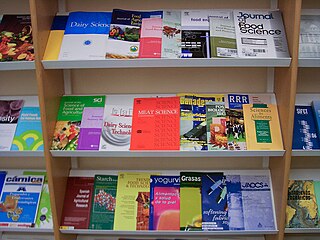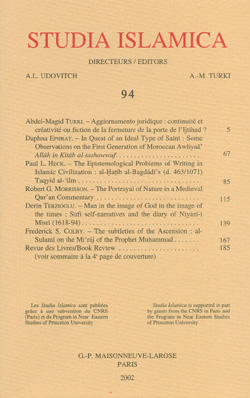
Centaurus. Journal of the European Society for the History of Science is a quarterly peer-reviewed, open-access academic journal. Centaurus publishes high quality academic content on the history of science in the broadest sense, including the history of mathematics, medicine, biomedical sciences, earth sciences, social sciences, humanities and technology, studied from different perspectives, including epistemic, social, cultural, material and technical aspects. It is the official journal of the European Society for the History of Science (ESHS).

An academic journal or scholarly journal is a periodical publication in which scholarship relating to a particular academic discipline is published. They serve as permanent and transparent forums for the presentation, scrutiny, and discussion of research. They nearly universally require peer review for research articles or other scrutiny from contemporaries competent and established in their respective fields.
Scopus is a scientific abstract and citation database, launched by the academic publisher Elsevier as a competitor to older Web of Science in 2004. An ensuing competition between the two databases has been characterized as "intense" and is considered to significantly benefit their users in terms of continuous improvent in coverage, search/analysis capabilities, but not in price. Free database The Lens completes the triad of main universal academic research databases.
The impact factor (IF) or journal impact factor (JIF) of an academic journal is a scientometric index calculated by Clarivate that reflects the yearly mean number of citations of articles published in the last two years in a given journal, as indexed by Clarivate's Web of Science.

Mankind Quarterly is a journal that covers physical and cultural anthropology, including human evolution, intelligence, ethnography, linguistics, mythology, archaeology, and biology. It has been described as a "cornerstone of the scientific racism establishment", a "white supremacist journal", and "a pseudo-scholarly outlet for promoting racial inequality". It is published by the Ulster Institute for Social Research, which was presided over by Richard Lynn until his death in 2023.

Studia Islamica is a biannual peer-reviewed academic journal covering Islamic studies focusing on the history, religion, law, literature, and language of the Muslim world, primarily of the Southwest Asian and Mediterranean regions. The editor-in-chief is Houari Touati. Articles are published in English or French.

Ephemerides Theologicae Lovanienses is a quarterly peer-reviewed academic journal covering theology and canon law. It was established in 1924 and is published by Peeters. It publishes articles, notes and comments, and reviews in English, French, and German. The journal is abstracted and indexed in the ATLA Religion Database and Scopus.

The Journal of Slavic Military Studies is a quarterly peer-reviewed academic journal that publishes articles relating to military affairs of Central and Eastern European Slavic nations, including their history and geopolitics, as well as book reviews. It is published by Routledge and the editor-in-chief is Martijn Lak. It was established in 1988 by David Glantz as The Journal of Soviet Military Studies, obtaining its current title in 1993. David Glantz was editor-in-chief from the founding of the journal until the end of 2017, with Alexander Hill briefly editing the journal from January 2018-March 2019.

Aspasia: The International Yearbook of Central, Eastern, and Southeastern European Women's and Gender History is an annual peer-reviewed academic journal covering research on women's and gender history in central, eastern, and southeastern Europe. Aspasia was founded in 2006 by Francisca de Haan at the Gender Studies Department of the Central European University and is published by Berghahn Journals. Early editorial board members included the historians Maria Bucur and Krassimira Daskalova.
Nationalities Papers is a peer-reviewed academic journal published by Cambridge University Press for the Association for the Study of Nationalities. The editor-in-chief is Harris Mylonas. It publishes articles on nationalism, minorities, and ethnic conflict, with a regional focus on Central and Eastern Europe, the Balkans, the former Soviet Union, Turkey, and Central Asia. The journal is interdisciplinary, with authors from a variety of backgrounds, including history, political science, sociology, anthropology, and literature. Nationalities Papers started in 1972 and currently publishes 6 issues per year.
ZooKeys is a peer-reviewed open access scientific journal covering zoological taxonomy, phylogeny, and biogeography. It was established in 2008 and the founding editor-in-chief was Terry Erwin until his death in 2020. In December 2023, Torsten Dikow was appointed the new editor-in-chief. It is published by Pensoft Publishers.

NeuroQuantology is a monthly peer-reviewed interdisciplinary scientific journal meant to cover the intersection of neuroscience and quantum mechanics. It was established in April 2003 and its subject matter almost immediately dismissed in The Lancet Neurology as "wild invention" and "claptrap". According to the Journal Citation Reports, the journal had a 2017 impact factor of 0.453, ranking it 253rd out of 261 journals in the category "Neuroscience". However, the journal has been delisted since the 2019 edition. The journal describes itself as focusing primarily on original reports of experimental and theoretical research. It also publishes literature reviews, methodological articles, empirical findings, book reviews, news, comments, letters to the editor, and abstracts. The founding editor-in-chief is Sultan Tarlacı, who was succeeded by Riyaz Ahmed abdul Khan.

The European Journal of Neuroscience is a biweekly peer-reviewed scientific journal covering all aspects of neuroscience. It was established in 1989 with Ray Guillery as the founding editor-in-chief. The current editors-in-chief are John J. Foxe and Yoland Smith. The journal is published by Wiley-Blackwell on behalf of the Federation of European Neuroscience Societies. Authors can elect to have accepted articles published as open access. The journal adopted transparent peer-review in January 2017.

Epoché: A Journal for the History of Philosophy is a peer-reviewed academic journal about the history of philosophy and its essential role in contemporary philosophical discussion. The journal is open to different ideas and approaches, but it is particularly interested in articles from the continental or hermeneutic traditions. The journal is edited by Sara Brill at Fairfield University. It is published twice yearly on a non-profit by the Philosophy Documentation Center.
The Latin American Research Review is a quarterly peer-reviewed academic journal covering research on Latin America and the Caribbean. It was established in 1965 by the Latin American Studies Association (LASA) and is published by LASA's publishing arm, the Latin America Research Commons. The editor-in-chief is Carmen Martinez Novo. Articles are published in English, Spanish, or Portuguese. The journal articles are published only electronically, in an Open Access format.
The Journal of the History of International Law is a biannual peer-reviewed academic journal covering the history of international law. It is published by Martinus Nijhoff Publishers and the Max Planck Institute for Comparative Public Law and International Law, Heidelberg. The journal is abstracted and indexed by Scopus.

Biomaterials Science is a peer-reviewed scientific journal that explores the underlying science behind the function, interactions and design of biomaterials. It is published by the Royal Society of Chemistry. The current editor-in-chief is Jianjun Cheng, while the executive editor is Maria Southall.
Review of Central and East European Law (RCEEL) is a quarterly peer-reviewed academic journal covering research on legal doctrine and practice in Central and Eastern Europe. It was established in 1975 under the name Review of Socialist Law and it was renamed to Review of Central and East European Law in 1991. It is published by Brill. The editor-in-chief is Joseph Marko of Karl-Franzens-Universität Graz. Aiste Mickonyte and Benedikt Harzl serve as managing editors. The journal is published in cooperation with the University of Graz, University of Tartu, and Leiden University.
FEMS Microbiology Reviews is a peer-reviewed scientific journal publishing invited review articles in the field of microbiology. The journal was established in 1985, and is published by Oxford University Press on behalf of the Federation of European Microbiological Societies. The editors-in-chief are Karin Sauer, David Blackbourn, and Bart Thomma.

Akropolis: Journal of Hellenic Studies is an annual open access peer-reviewed academic journal devoted to the study of Hellenic culture and civilization from antiquity to the present. It was established in 2017 and is published by the Center for Hellenic Studies, based in Podgorica.












